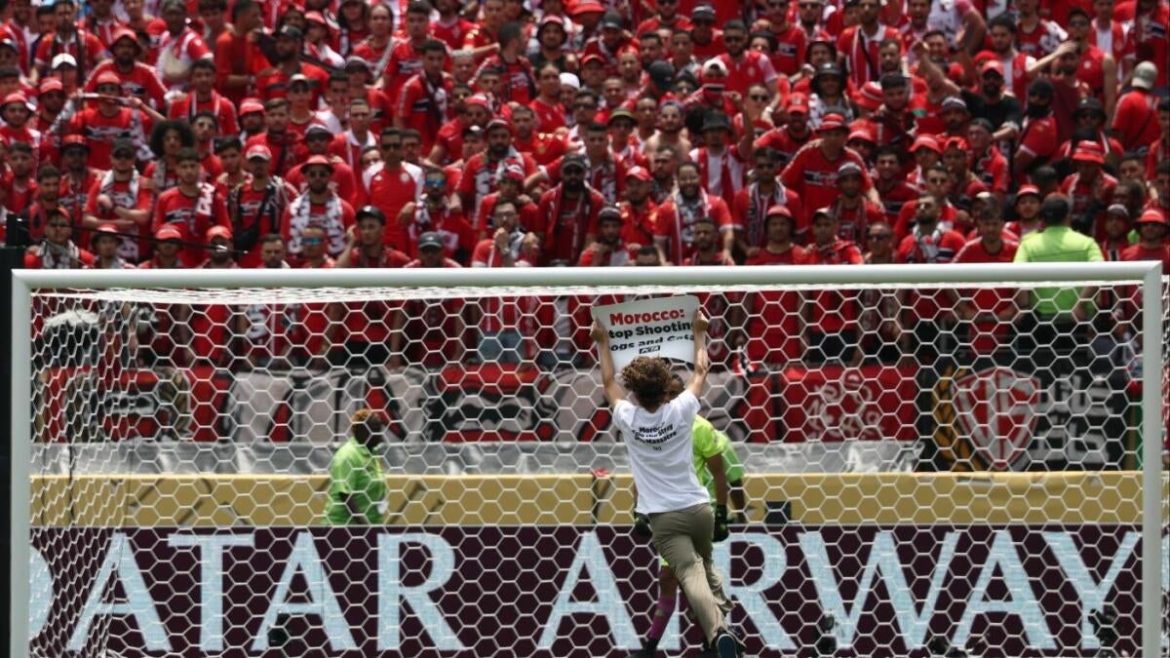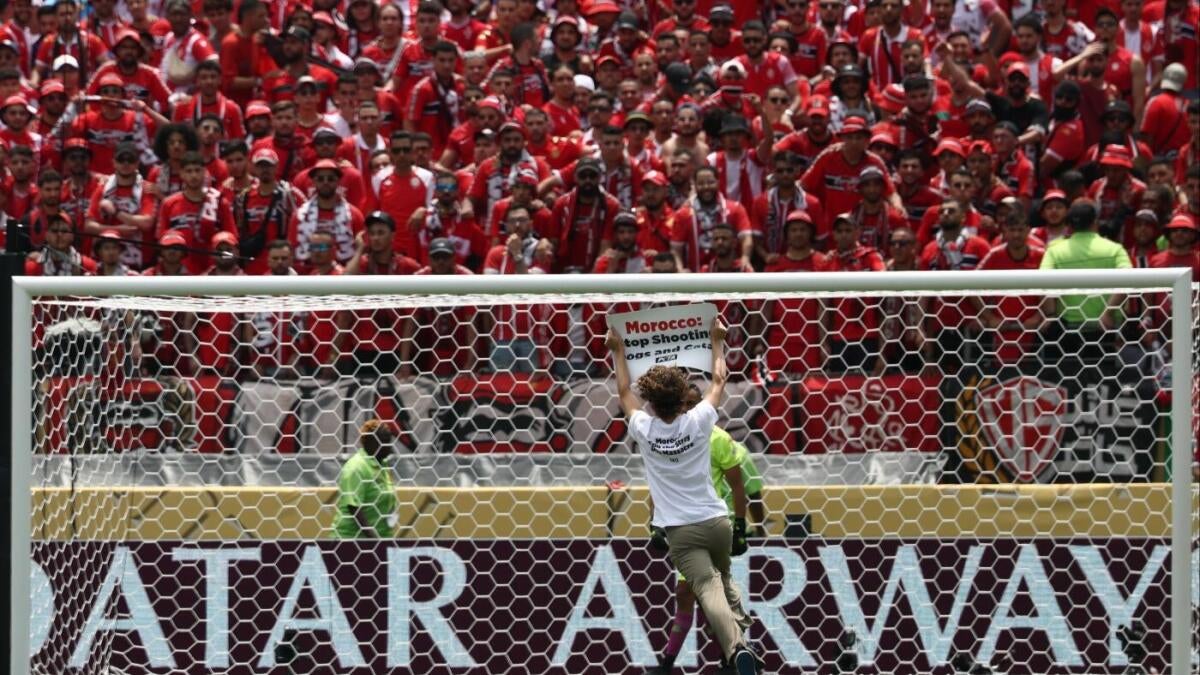A Protest on the Pitch: Animal Welfare Concerns Disrupt the Club World Cup
The recent FIFA Club World Cup match between Manchester City and Wydad in Philadelphia was dramatically interrupted by an animal rights protest, bringing to light serious allegations of animal cruelty in Morocco. This incident, far from being a standalone event, represents a growing international outcry over the Moroccan government’s treatment of stray animals, particularly in anticipation of co-hosting the 2030 FIFA World Cup. The protest, executed by a PETA activist, wasn’t merely a disruption of the game; it was a calculated attempt to leverage the global stage of the Club World Cup to draw attention to a deeply troubling issue.
The Interruption and the Message
During the match at Lincoln Financial Field, an activist ran onto the pitch carrying a sign with the stark message: “Morocco – Stop Shooting Dogs and Cats!” The protester’s actions, while causing a temporary halt to the game, were specifically designed to highlight what animal rights groups claim is a systematic campaign of culling stray animals in Morocco. Reports suggest that authorities are rounding up and killing these animals, ostensibly to present a sanitized image to tourists and prepare for the influx of visitors expected during the 2030 World Cup. Multiple news outlets confirmed the incident, emphasizing the protester’s intent to urge Morocco to reform its policies regarding stray animal welfare. The timing of the protest, coinciding with a high-profile international sporting event, underscores the strategic nature of the activist’s actions.
The Allegations: A Campaign of Culling
The core of the controversy lies in accusations that Morocco is undertaking a large-scale culling of stray dogs and cats. Animal rights organizations, including PETA and a collective of ten international groups, have presented evidence – including disturbing footage – suggesting the public killing of street dogs. Estimates range alarmingly, with some reports claiming up to three million dogs could be targeted. The stated justification for this action is the prevention of rabies and the desire to create a more aesthetically pleasing environment for the World Cup. However, activists argue that humane alternatives, such as trap-neuter-release (TNR) programs, are readily available and far more ethical. The claim that animals are being *shot* is particularly disturbing, painting a picture of brutal and inhumane practices.
FIFA and the 2030 World Cup: A Shadow of Controversy
Morocco is set to co-host the 2030 FIFA World Cup alongside Spain and Portugal. This prestigious event is intended to showcase the nation on a global scale, but the allegations of animal cruelty are casting a dark shadow over preparations. Animal welfare groups are actively calling on FIFA to reconsider Morocco’s hosting bid, arguing that allowing the country to host the tournament would effectively endorse its alleged inhumane practices. The situation presents a significant ethical dilemma for FIFA, forcing the organization to weigh the economic and political benefits of the partnership against the moral implications of supporting a nation accused of widespread animal abuse. The timing is crucial; the controversy is gaining momentum years before the event, allowing time for potential intervention and policy changes.
PETA’s Role and Activist Strategies
PETA (People for the Ethical Treatment of Animals) has been at the forefront of the campaign against Morocco’s animal welfare policies. The organization has consistently criticized the Moroccan government and actively sought to raise awareness of the issue. The pitch invasion was a direct action intended to disrupt a major event and generate media coverage. PETA’s strategy relies on shock tactics and leveraging public attention to pressure governments and organizations to change their policies. The organization has also written letters to FIFA, demanding action and highlighting the ethical concerns surrounding Morocco’s hosting bid. This incident is part of a broader pattern of PETA’s activism, which often involves controversial and attention-grabbing protests.
Beyond the Headlines: The Plight of Morocco’s Strays
The situation extends beyond the immediate concerns of the World Cup. Morocco has a significant population of stray animals, a problem exacerbated by a lack of comprehensive animal welfare legislation and limited resources for animal shelters and care. Many of these animals are vaccinated and cared for by local volunteers, creating a heartbreaking contrast with the alleged government-sanctioned culling. The reports of tagged and vaccinated dogs being rounded up and killed are particularly distressing, highlighting the disregard for the efforts of animal lovers on the ground. The issue is further complicated by the prevalence of rabies in some areas, which authorities cite as a justification for the culling programs. However, animal welfare advocates argue that mass killing is not an effective solution to rabies control and that vaccination programs are far more sustainable and humane.
A Call for Accountability and Humane Solutions
The Club World Cup protest served as a powerful, albeit disruptive, reminder that sporting events are not immune to ethical scrutiny. The allegations against Morocco demand a thorough and independent investigation. FIFA has a responsibility to ensure that its partnerships align with fundamental principles of animal welfare. The Moroccan government must be held accountable for its treatment of stray animals and urged to adopt humane and sustainable solutions, such as comprehensive TNR programs, increased funding for animal shelters, and the implementation of robust animal protection laws. The international community must also exert pressure on Morocco to prioritize animal welfare and demonstrate a commitment to ethical practices as it prepares to host the 2030 World Cup. The image of a global sporting event should not be tarnished by the suffering of innocent animals.
A Lasting Impact?
The incident at the Club World Cup has undoubtedly amplified the voices of animal rights activists and brought the issue of animal welfare in Morocco to the forefront of international attention. Whether this will translate into meaningful change remains to be seen. However, the protest has established a clear precedent: animal welfare concerns will not be ignored, even on the world’s biggest sporting stages. The future of Morocco’s 2030 World Cup hosting, and more importantly, the lives of countless animals, may well depend on the actions taken in the coming months and years.





